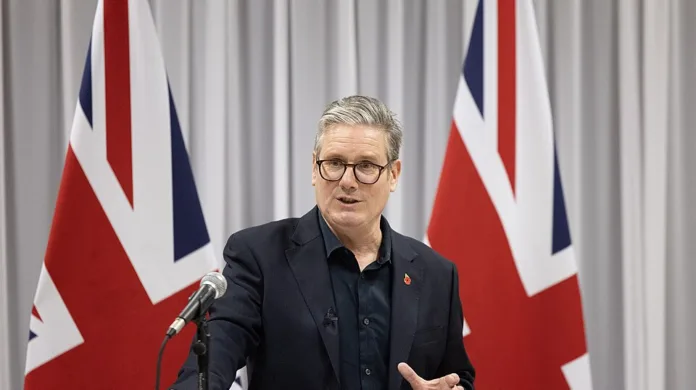PM insists new UK-India trade deal is about investment and jobs, not immigration changes
Prime Minister Sir Keir Starmer has said the UK will not relax visa rules for India, as he arrived in Mumbai to promote the benefits of a new post-Brexit trade agreement between the two countries.
Speaking ahead of his two-day visit, Sir Keir said the UK’s focus was on business partnerships, investment and job creation — not on immigration policy.
“The issue is not about visas,” he told reporters on the flight to India. “It’s about business-to-business engagement and investment and jobs and prosperity coming into the United Kingdom.”
The prime minister is leading a high-profile delegation of more than 100 business leaders, university vice-chancellors and cultural figures, in what Downing Street described as a “strategic mission” to boost UK trade links and attract new investment.
Sir Keir said there were “massive opportunities” for cooperation with India, but reiterated that there were no plans to expand visa routes for Indian workers or students as part of the new trade partnership.
The UK-India trade deal, signed in July after years of negotiation, aims to lower tariffs and open markets for both sides. Under the agreement, British exports such as cars and whisky will become cheaper in India, while Indian textiles and jewellery will face reduced tariffs in the UK. The deal is expected to generate billions of pounds in additional trade between the two nations.
However, ministers have made clear that the deal does not include wider changes to immigration policy. The only concession on movement of workers is a three-year exemption on social security payments for Indian employees working in the UK on short-term visas.
The Labour government, which came to power pledging to cut overall migration levels, reaffirmed its tough stance on settlement and visa routes at last week’s party conference. Officials insist that reducing net migration remains a central priority, even as the government seeks to deepen trade relations abroad.
Asked whether Britain might seek to attract more tech entrepreneurs and skilled workers from India, especially following US President Donald Trump’s changes to the H-1B visa programme, Starmer said the UK would always welcome “top talent” but stressed that this did not mean opening new visa pathways.
“We want to attract the best and brightest from across the globe to grow our economy,” he said. “But the trade deal with India is not about visas — that played no part in our negotiations.”
During the trip, Starmer is expected to meet Indian Prime Minister Narendra Modi, continuing efforts to strengthen political and economic cooperation between the two countries. The visit comes after Modi recently posted birthday greetings to Russian President Vladimir Putin — a move Starmer said he would not be replicating.
“Just for the record, I haven’t sent birthday congratulations to Putin, nor am I going to do so,” he told journalists. “I don’t suppose that comes as a surprise.”
When asked if he would raise concerns about India’s continued purchase of Russian oil, Starmer said the UK’s focus was on disrupting the so-called “shadow fleet” — a network of unregulated tankers used to transport Russian crude.
“The UK has been one of the lead countries in addressing the shadow fleet,” the prime minister said, describing it as part of Britain’s broader sanctions effort against Moscow.
The business delegation accompanying Starmer includes representatives from major companies such as British Airways, which announced plans to introduce a third daily flight between Delhi and Heathrow next year, and Manchester Airport, which revealed a new direct route to Delhi.
Officials hope the visit will highlight the UK’s post-Brexit trade ambitions and strengthen ties with one of the world’s fastest-growing economies. But for now, the message from Downing Street is clear: while investment and collaboration are welcome, immigration policy will remain firmly under UK control.
